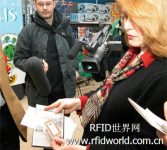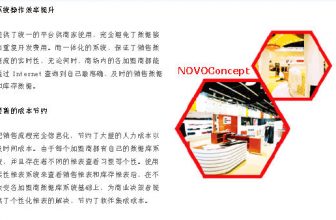
Wal-Mart and Best Buy start a pilot project for labeling DVD single products
[ad_1]
Wal-Mart, Best Buy, and other members of the EPCglobal Audiovisual and Entertainment Industry Interest Group launched a single-product-level DVD labeling pilot project this month to test the use of EPC RFID tags to ensure that DVD products are in sufficient inventory and ready for customers to purchase.
The companies participating in this project run through the entire supply chain of the audiovisual entertainment industry, including audiovisual product producers, manufacturers, distributors and retailers. The duration of the project is 8 weeks, and participants hope to obtain enough information to achieve large-scale item-level RFID labeling.

Item-level RFID labeling
Participants hope that RFID can provide them with more transparent product visibility, such as where the product is located, when it is on shelf, and when it needs to be restocked. In addition, they also hope to use the technology to reduce stock-outs. “RFID helps us ensure that customers can buy the goods they need at any time,” said Wal-Mart spokesperson John Simley.
The project was launched on September 26. Participants posted EPC Gen 2 RFID tags on 15 movies and about 12,000 DVDs. These DVDs are provided by 20th Century Fox, Cinram International, Sony Pictures Home Entertainment, Technicolor and Warner Home Video. Each RFID label is printed with an EPCglobal icon and a text introduction about RFID technology.
DVD manufacturers use a fixed RFID reader to obtain the ID number of each label. The data related to each DVD is stored in the participant’s back-end system-a database built using the EPCglobal EPCIS standard, which can share data with other project participants.
Then the product is sent to the distributor, such as Handleman Co; or directly to the retailer. After receiving the DVD, Wal-Mart and Best Buy read the RFID tag again before sending it to the store warehouse.
In addition, retailers are testing RFID readers installed in the filtering area between store warehouses and stores (in some scenarios are containers or promotional counters). They also use handheld readers to search for a particular movie in the store.
Through EPCIS, participants can obtain information about products and their locations. According to EPCglobal official Gay Whitney, project participants used a variety of EPCIS software systems to obtain and compile data.
Wal-Mart is now testing RFID systems in stores in Oklahoma, Simley said. Although RFID technology has been used in more than 1,000 stores to track labeled pallets and boxes, Simley said this is the first time Wal-Mart has used RFID to track a single item in a store. Wal-Mart installs readers in filtering areas, entrances and exits of warehouses and stores.
Simley explained that by installing a reader at the exit, Wal-Mart can identify thieves trying to steal DVDs. Currently, this project is just a simple test of the read rate of tags in the store. Wal-Mart also uses handheld readers to test the reading distance in stores.
In order to help customers understand the system, Wal-Mart installed signage in the DVD area and entrance of the store, declared the application of the EPC label, and explained the working principle of the label and the reason for its use.
The EPCglobal Audiovisual and Entertainment Industry Interest Group met for the first time in January 2007 and soon agreed to launch a pilot project. At that time, companies in the audiovisual entertainment industry basically agreed that item-level labeling would benefit the entire industry, Whitney said.
The project uses the software, hardware and services of many RFID companies: ADT Sensormatic, Avery Dennison, Checkpoint Systems, Impinj, Motorola, Nashua Corp., NXP Semiconductors, OATSystems, Omron RFID, Printronix, SATO America, T3Ci, True Demand Software, UPM Raflatac, Vue Technology and Zebra Technologies.
The project ends in November, when the test results will be announced on the EPCglobal official website.
[ad_2]






